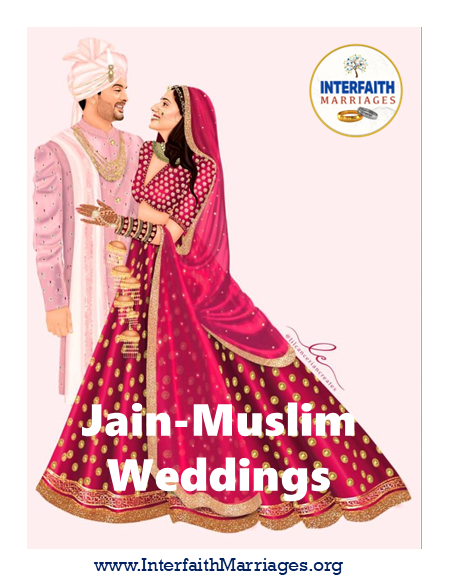Jain Muslim Marriages
By Mike Ghouse – some of it is compiled from various sources.
Jain Muslim Marriages — Overview
Does it happens only in America? No, it happens in every pluralistic society where people of different faiths, races, and ethnicities interact—in colleges, workplaces, libraries, restaurants, on planes, buses, or trains.
In this article, I will explore the marriage between a Jain and a Muslim. I will begin with a preamble, followed by the concerns of their parents. The ultimate goals in both traditions are liberation, peace, and harmony.
A wedding is a celebration of love between two individuals. As a professional wedding officiant, I guide couples in creating meaningful ceremonies that reflect their unique cultures, beliefs, and traditions.

Jain Muslim Marriages — Love & the Divine Connection
You may be curious about what brings a Jain and a Muslim together. First, I want to quote Mirza Ghalib, India’s renowned poet.
ishq par zor nahīñ hai ye vo ātish ‘ġhālib’
ki lagā.e na lage aur bujhā.e na bane
One has no power over Love, it is that flame, to wit,
Which neither can be set alight, nor extinguished once lit
Love happens.
God loves people to be married and live in harmony, and it is he who brings them together. I am pleased to share the verse from the Quran 30:21
وَمِنْ آيَاتِهِ أَنْ خَلَقَ لَكُم مِّنْ أَنفُسِكُمْ أَزْوَاجًا لِّتَسْكُنُوا إِلَيْهَا وَجَعَلَ بَيْنَكُم مَّوَدَّةً وَرَحْمَةً إِنَّ فِي ذَٰلِكَ لَآيَاتٍ لِّقَوْمٍ يَتَفَكَّرُونَ
Bijan Moeinian’s translation states: “Another sign of the existence of God is the creation of your spouses from your own species so that you do not suffer from loneliness and may find tranquility living next to each other. It is God who sparks love between you. There are many subjects to reflect on this topic for those who use their intellect.”
Reflecting on Bijan’s phrase, “spouses from your own species so that you may find tranquility,” I consider the natural order: monkeys do not mate with dogs, dogs do not mate with tigers, and tigers do not mate with goats. Each species has its own mate, just as humans are meant to find comfort among their own kind.
With 8 billion people on Earth, God guides two hearts to come together like a divine GPS. Most people find peace and harmony in their relationships. Nature’s principle remains universal—love, harmony, and tranquility are part of creation’s design, and marriage is an extension of it
Jain Muslim Marriages — Reflection on Creation and Human Bonds
Reflection on Creation and Human Bonds
The very first verse in the Quran declares that God is the Rabbul Aalameen, the creator of the entire universe. He does not differentiate between His creations but provides guidance to help us live in peace, security, and harmony.
The universe is programmed to function as designed. Consider the planets, Mother Earth, the human body, and plants; they all function as programmed by nature. The only aspect that the creator did not program is human interactions; we were granted freedom, which can either foster harmony or lead to conflict.
To keep us on the right path, God sends guidance through prophets in Islam, and Tirthankaras in Jainism as a means to maintain this harmony. Both serve as perfected souls: Tirthankaras embody the highest virtues and act as role models for Jains on their spiritual journey. Similarly, the Prophet in Islam represents the highest virtues and serves as a role model for Muslims.
Jain Muslim Marriages — Liberation in Both Traditions
Liberation is the ultimate goal in both traditions. In Islam, on the Day of Judgment, God will assess the good you have done for His creation and grant you freedom into paradise, a state pf mind or place without worries, anxieties, or fear, where you live in peace. A pious individual in Islam is someone who acts in the best interest of fellow humans, animals, and all elements of the universe. Likewise, the Tirthankaras show that liberation can be achieved through self-effort and adherence to Jain principles, inspiring followers to pursue their path of peace and harmony. Both traditions promote universally applicable principles.
In Jainism, there are 24 Tirthankaras in the current cosmic cycle. The first Tirthankara is Lord Rishabhanatha, and the last is Lord Mahavira. Similarly, the Quran mentions 24 Prophets, while acknowledging an infinite number sent to every tribe and nation. The first Prophet is Adam, and the last is Prophet Muhammad (pbuh).
The essence of Jainism lies in the pursuit of spiritual liberation through the principles of non-violence (ahimsa), truth, and self-discipline. It emphasizes living an ethical life to purify the soul and achieve moksha, the ultimate freedom from anxieties, pain, and worries. In Islam, the equivalent concept is Nijaat, representing ultimate freedom.
The essence of Islam is peace. The role of a Muslim is to promote goodwill among God’s creation, address conflicts, stand up for justice, and work towards restoring dharma—righteousness for all humanity, allowing everyone to live in harmony and security.
Jains strive to live compassionately, avoid harm, and cultivate inner peace, aiming for a state of eternal bliss and omniscience.
Jain Muslim Marriages — Can a Jain and a Muslim Live Together?
Can a Jain and a Muslim live with each other as a married couple?
Both Jains and Muslims, despite persecutions in the past have shown remarkable resilience. They have developed systems and rules to protect their communities, demonstrating their strength and determination. While neither Jainism nor the Quran prohibits living alongside others, societal conflicts often arise, but the communities have shown their ability to overcome such challenges.
In the United States, we are fortunate to have the freedom to live by our principles without conflict. This freedom, enshrined in our values, allows individuals to practice their faith and beliefs without fear of persecution, fostering a diverse and inclusive society.
Jains avoid all forms of meat, just as Muslims do not consume pork. However, the couple can determine what works best for them based on their comfort levels. I have known many couples who practice Anekantvada. You are who you are, and I am who I am. We can learn to respect the differences and accept the unique qualities of each person.
Jains can meditate and reflect privately or in another room of their home, or they can attend temple gatherings for social interaction. It’s important to remember that none of us is an island. Muslims, similarly, can pray at home or go to the Masjid for congregational prayers, which are designed to foster mutual understanding and strengthen community bonds.
Jain Muslim Marriages — Scriptures
Scriptures
The primary scriptures of Jainism are the Agamas (or Agam Sutras), which are collections of teachings from the Tirthankaras, the spiritual teachers who have attained enlightenment, especially Mahavira, compiled by his disciples.
For Muslims, the primary scripture is the Quran, along with collections of teachings from the Prophet Muhammad, such as the Hadith, Seerah, and Tafseers.
Jain Muslim Marriages — Festivals & Social Life
Jain and Muslim Festivals
You can choose to learn about each other’s rituals with respect, and participate in the cultural aspects of the festivities, while avoiding religious part of the ceremony. Since these celebrations are focused on family and community, it’s important to communicate your boundaries to the parents, so they don’t make any assumptions about your level of involvement. I’m happy to guide you on this topic.
One of the significant festivals in Jainism is Paryushan, a week-long period (7 or 9 days) of fasting and repentance. During this time, Jains abstain from food and focus on spiritual reflection and cleaning the slate of life. The phrase “Michami Dukkadam” is used to greet each other, meaning “Let’s forgive each other’s shortcomings and live peacefully in the coming year.” This is similar to Ramadan, which involves 30 days of fasting from dawn to sunset and daily prayers.
There are other festivals or commemorations, such as Bakrid, Milad, Muharram, Diwali, Mahavir Jayanti, Gyana Panchami, and many more. All these festivities focus on social celebrations.
Personally, I make choices that align with my beliefs and values. While others may choose to drink alcohol, I opt for water or soft drinks. If pork is served, I prefer to have a salad. My personal choices are respected, and I feel empowered to make decisions that reflect my identity and beliefs. At the same time, I recognize and make my place within the larger society of the universe.
Jain Muslim Marriages — Anekantavada & Dialogue
Anekantavada
Anekantavada is a central doctrine in Jainism that teaches that truth is multifaceted. It asserts that no single perspective can fully encompass the totality of reality, emphasizing the importance of considering diverse viewpoints and engaging in open dialogue. The Jain parable of the blind men and the elephant effectively illustrate this doctrine.
Prophet Muhammad (pbuh) was the first person to conduct interfaith dialogues aimed at understanding different perspectives. He invited individuals from various faiths to his mosque to discuss their beliefs. The Quran encourages treating everyone equally in discussions about interfaith matters. For example, it guides Muslims to express ideas like, “I don’t worship the way you do, and you don’t worship the way I do.” This approach highlights the beauty of respecting another perspective, as it never implies that one’s worship is inferior to another’s; both are placed on equal footing.
Both Muslims and Jains share beliefs in accountability and in caring for creation.
Jain Muslim Marriages — Further Reading & Links
For reflections
Who is a Muslim and what is Islam?
https://interfaithmarriages.org/who-is-a-muslim-and-what-is-islam/
What is a progressive Islam?
https://worldmuslimcongress.org/progressive-islam-reviving-the-prophets-vision-in-todays-world/
Conducting a Civil Dialogue
https://centerforpluralism.com/quran-and-civil-dialogue/
Shaping America’s Future
https://centerforpluralism.com/shaping-americas-future-building-a-stronger-united-and-inclusive-nation/
Jain Muslim Marriages — About the Author
Dr. Mike Ghouse is an interfaith wedding officiant, social scientist, speaker, author, activist, and a pluralist. He serves as the president of Interfaith Marriages and the Center for Pluralism, and is the director at the World Muslim Congress and Indians Together.

